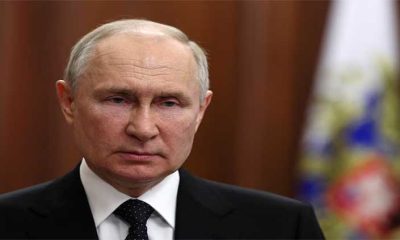A year after President George W. Bush launched the 2003 US-led invasion of Iraq, four US civilian security contractors in SUVs took an ill-fated turn into the Iraqi city of Falluja.
Their assignment was to protect a convoy of catering trucks. It would be their last, and what happened to them would prove a defining moment in a conflict that – far from being “Mission Accomplished” as Bush had declared less than a year earlier – had only just begun.
Masked insurgents ambushed the contractors using rocket-propelled-grenades and AK-47 rifles on a main street in Falluja, part of the Sunni Triangle, a central region of mainly Sunni Muslims that had been the powerbase of Saddam Hussein who had been toppled by the invasion launched on March 20, 2003.
Arriving in the city an hour or so after the ambush on March 31, 2004, I was confronted by a crowd kicking the head of an incinerated body. Others dragged a charred corpse by its feet.
I was taking notes, trying to make sense of the furore, when a boy, who was probably aged about nine, approached. Standing over two blackened bodies, he offered to help me out.
“We hung the others from a bridge. Would you like to see them? I can take you there,” he said.
The attack in Falluja, 32 miles (50 km) west of Baghdad, and those violent scenes heralded not just more attacks on US troops but a broad insurgency that swelled the ranks first of Al Qaeda and then Islamic State, miring Iraq in conflict and chaos from which it has yet to fully emerge two decades later.
Falluja still bears the scars of battles that have raged through its streets. Beyond the smart main road entering the city, walls bear the pockmarks of bullets and some buildings that were pounded into the ground in military operations still lie in ruins. The city is chronically short of funds to rebuild war damaged infrastructure which would cost more than $2 billion, Talib al-Hasnawi, Falluja town council chief, told Reuters.
“It’s true that the rebuilding process is below our expectations due to the limited resources and budget, but we are not stopping rebuilding what wars have damaged,” he said.
Still, security in the city today is much improved. Families travel from Baghdad just to have dinner at Falluja Badiya, a famous kabab restaurant. Trade, agriculture and fish farming are on the increase, al-Hasnawi said.
Twenty years ago, violence across Iraq was stoked further by sectarian tensions, pitting minority Sunnis, who had enjoyed a privileged status under Saddam Hussein, a Sunni himself, against Shi’ites, the majority who had been oppressed under his rule.
Tens of thousands of Iraqi civilians and insurgents were killed in the years that followed the US invasion, launched on the basis of a US charge that Iraq had stockpiled weapons of mass destruction, a claim that proved a chimera.
When US combat troops pulled out of Iraq in 2011, 4,418 US soldiers had died, alongside hundreds of foreign troops, contractors and civilians.
HOTSPOT
In the two decades of turmoil since the invasion, Falluja repeatedly emerged as a hotspot.
“Falluja is the cemetery of Americans,” the crowd had chanted on that day in 2004 when gunmen killed the four contractors who worked for the Blackwater USA security firm: Jerry Zovko, Wesley Batalona, Michael Teague and Scott Helvenston.
I saw an Iraqi douse one of the corpses with petrol, sending flames soaring into the air. Witnesses said at least two bodies were tied to cars and dragged through the streets. Later in the day, I saw body parts hung from a telephone line.
Iraqi frustration at what they saw as the mismanagement of the US administration had been quick to emerge after the US and coalition forces swept into Baghdad and across Iraq.
Paul Bremer, who governed Iraq’s Coalition Provisional Authority (CPA) for 13 months after Saddam Hussein was toppled, said the Falluja attack was “certainly a horrendous act” but he told Reuters in a March 14 interview that US forces were not deployed in sufficient number in Iraq to prevent the worsening of security.
“We never had enough people on the ground in Iraq,” he said.
Ultimately Bremer disbanded Iraq’s army, leaving 400,000 soldiers without jobs, which Western and Iraqi critics of the US action said provided a ready pool of recruits for Islamist groups and other insurgents that emerged.
In the interview with Reuters, Bremer defended his decision, saying the army, which consisted of Saddam’s soldiers, had attacked the Kurds and the Shi’ites, and so preserving the force would have risked a civil war.
As violence spiralled, Al Qaeda militants seized control of Falluja, prompting two US offensives. After US forces pulled out of Iraq, Islamic State seized control of the city in 2014, leading to a seige by Iraq’s army and Shi’ite militias.
‘THIS IS WHAT WILL HAPPEN’
In 2004, I followed the boy who had offered me help through Falluja, a city of low rise middle class homes owned by families who had struggled under years of international sanctions ever since Saddam Hussein’s 1990-1991 invasion of Kuwait that was ended by another US-led coalition.
We reached the bridge from which two of the contractor’s corpses were dangling. Below them were families, some with young children, honking car horns or clapping in celebration.
“I am happy to see this,” said one 12-year-old onlooker, a boy called Mohammad. “The Americans are occupying us so this is what will happen.”
US officials at the time blamed the killings on supporters of Saddam Hussein, saying they wanted to restore the old order, but said the United States would not be diverted from building democracy.
“We will be back in Falluja. It will be at the time and place of our choosing. We will hunt down the criminals,” Army Brigadier General Mark Kimmitt said in response to the killings.
Days later, the US military launched an offensive saying it aimed to “pacify” the city, rid it of insurgents and find those responsible for the March 31 ambush.
Under Saddam Hussein’s repressive rule, Sunnis in Falluja and across Iraq had been the main beneficiaries of official patronage in business, government posts and the army, while Shi’ites were sidelined. That changed after the US invasion.
As power shifted to the majority Shi’ite community, a Sunni insurgency gathered pace. A host of militias, backed by predominantly Shi’ite Iran, also emerged.
Iraq’s death toll mounted, amid car and truck bombs, improvised explosive devices, suicide bombers, beheadings, sectarian death squads and torture chambers.
Salman al-Fallahi, a tribal sheikh from Falluja, looks back today on the violence that has scarred a generation of Falluja youths psychologically and which he thinks could have been averted.
“I believe if we were to go back in time, the Americans would not have done what they did and we would not have responded with such severity,” he told Reuters. “We would have avoided many things.”
Al-Hasnawi, Falluja’s town council chief, said the killing of the contractors was against Islam and later “Falluja and all its people lived in hell because of this incident”.
But he stressed that people today are ready to move on from what he called “the dark days”.
“Now almost everyone in Falluja understands the consequences of such reckless actions … all the following destruction and death in Falluja was a result of killing the four Americans and mutilating their bodies,” he said. “Enough is enough.”
Post Views: 75


 Fashion3 months ago
Fashion3 months ago
 Sports3 months ago
Sports3 months ago
 Sports3 months ago
Sports3 months ago
 Fashion2 months ago
Fashion2 months ago
 pakistan3 months ago
pakistan3 months ago
 World3 months ago
World3 months ago
 pakistan3 months ago
pakistan3 months ago
 Tech3 months ago
Tech3 months ago



















